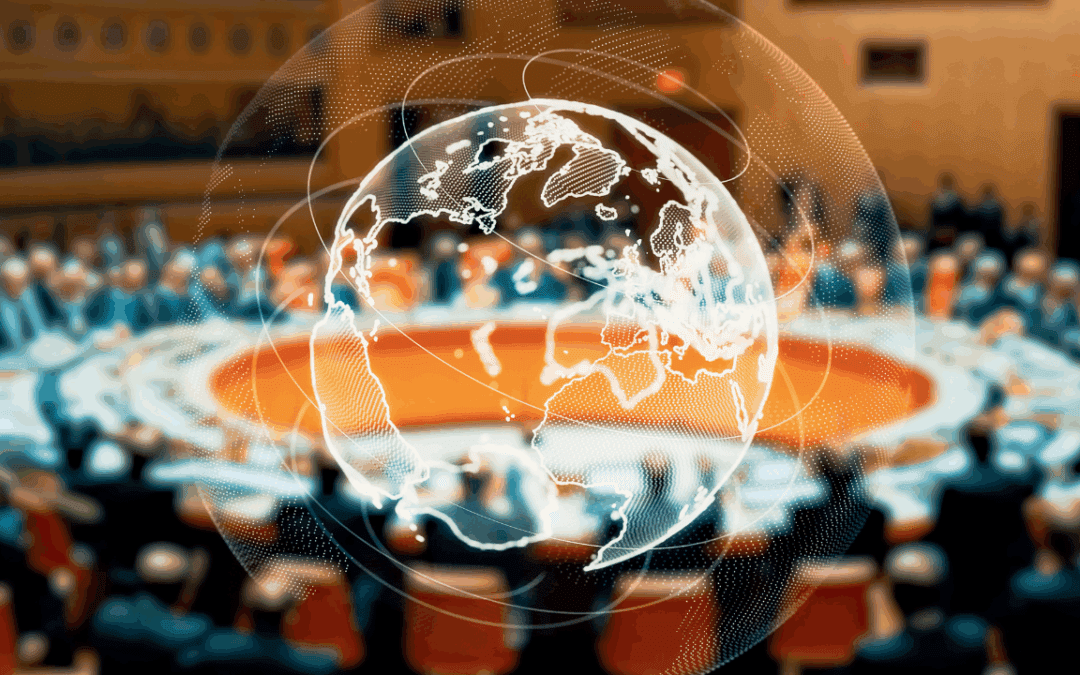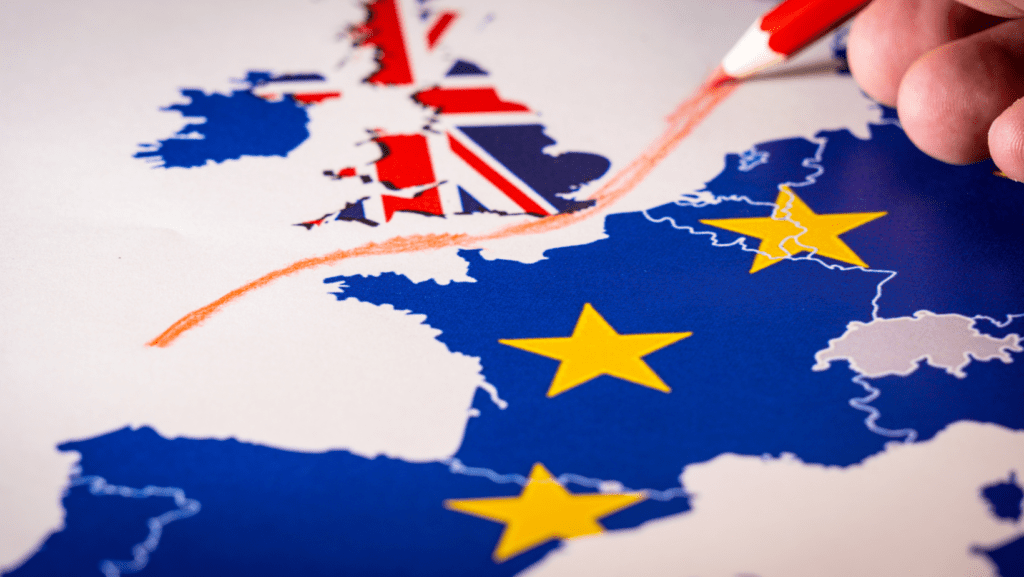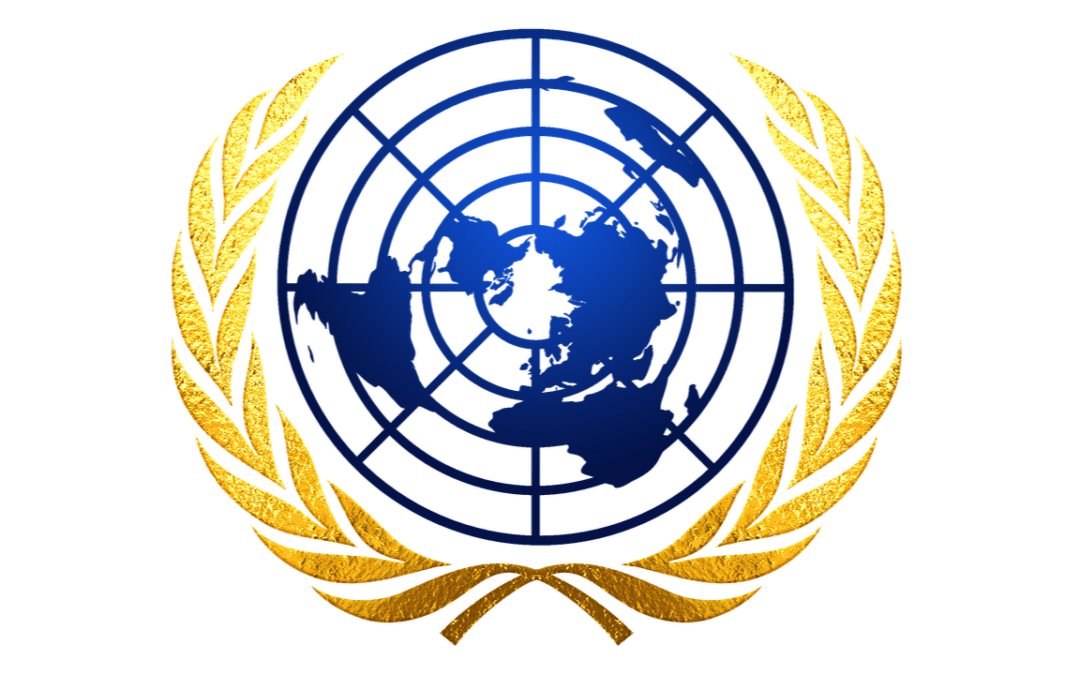
by Jacopo DeMarinis | Oct 9, 2025 | World Federation
On September 18th, the United Nations Security Council, the principal organ of the United Nations entrusted with maintaining international peace and security, introduced a resolution demanding an immediate and permanent ceasefire in Gaza, the immediate release of all hostages, and the lifting of restrictions on humanitarian aid to prevent the growing famine. Fourteen members of the fifteen-member council voted in favor. One member, the United States, voted against it. The resolution was thrown out.
Does this seem fair to you? Well, this is par for the course at the UN Security Council. Five permanent members (P5)—China, the United Kingdom, the United States, Russia, and France—can veto any resolution, immediately discarding it. The significance of this is heightened by the fact that the Security Council’s resolutions are binding, unlike the more representative General Assembly, whose resolutions are merely recommendations. In the past, the Security Council has passed binding resolutions authorizing dozens of peacekeeping operations to address conflicts in the Balkans, Angola, Somalia, Haiti, and other countries.
Unfortunately, history has shown that the P5 will leverage their position in the Council to block a resolution that threatens their interests, as Russia did regarding a February 2022 Security Council resolution that would have demanded an end to the Ukraine war. More recently, Russia blocked a UN Security Council resolution calling an end to the civil war in Sudan. Since the inception of the Security Council in 1945, a veto has been cast 326 times; out of these, Russia has wielded the veto 161 times, the United States, 94 times, China, 21 times, and the United Kingdom and France, 32 and 18 times, respectively.
To enhance the P5’s accountability to other UN countries, the UN General Assembly recently passed a resolution urging the veto-casting member to provide an explanation for their decision. This resolution harks back to the 1950 UN General Assembly “Uniting for Peace ” resolution, which provided the General Assembly with the opportunity to address any matter pertaining to international peace that has paralyzed the UN Security Council.
“Great power” capture of the global landscape is also apparent in nuclear disarmament issues. The Treaty on the Non-Proliferation of Nuclear Weapons (NPT), which entered into force in 1970, requires nuclear weapons states, which include the P5, to negotiate the complete disarmament of their nuclear weapons. Despite this mandate, nine countries now have nuclear weapons and these countries are upgrading their “strategic nuclear forces,” in defiance of the NPT. Unsurprisingly, these same countries unanimously oppose the Treaty on the Prohibition of Nuclear Weapons (TPNW). The TPNW was borne out of non-nuclear weapons states’ frustration with noncompliance with NPT, by prohibiting any country party to the treaty from possessing nuclear weapons.
Then, there is climate change. Despite embracing green energy more, the world’s top polluters, including the United States and China, are still burning carbon dioxide at an unsustainable rate which threatens to raise global temperature increase to above the 1.5 degree Celsius limit set by the Intergovernmental Panel on Climate Change. This means that the worst effects of the climate crisis will not be averted. Furthermore, the fact that powerful countries like the United States have openly defied international climate treaties like the Paris Accords- which the United States withdrew from in 2020, rejoined in 2021, and then withdrew from again with the re-election of Donald Trump- weakens international climate coordination and fosters a culture of unaccountability and skepticism about global climate governance.
Furthermore, the COP29 conference last year in Baku is seen by many climate activists and governments in the Global South as a failure, albeit a step in the right direction. Wealthy countries agreed to commit $300 billion a year by 2035 to aid developing countries in reducing carbon dioxide emissions and transitioning to clean energy, which is far from the $1.3 trillion annually for climate financing that developing countries were pushing for. It’s ironic that the burden will be felt mainly by small island states and developing countries in the Global South that have contributed least to the crisis.
To address this climate injustice, the Pacific Island nation of Vanuatu initiated proceedings with the International Court of Justice (ICJ) in 2023, requesting an advisory opinion regarding the legal obligations of states with respect to climate change. Vanuatu’s decision to present a UN General Assembly resolution initiating climate proceedings with the ICJ was due mainly to the determined climate justice efforts of youth activists from Pacific Island states, including civil society organizations like World’s Youth for Climate Justice. While the ICJ’s advisory opinions are not legally binding on countries, the ICJ’s ruling will hopefully set a precedent regarding international action to address climate change. Updates regarding the ICJ’s climate case can be viewed here.
It’s clear that the big power-dominated international order is unsustainable. The Bulletin of the Atomic Scientists’ decision to move the Doomsday Clock to 90 seconds to midnight, the closest to complete catastrophe we’ve ever been, has highlighted the importance of constructing an international system characterized by political equality and social and economic justice. The actions detailed above- creating the TPNW, involving the ICJ in climate matters, holding the P5 accountable to the General Assembly, and proposals for comprehensive Security Council reform are a definite starting point.
However, we must treat not just the symptoms but also the underlying disease: gross global power imbalances. This requires strengthening international law and modifying and/or establishing global institutions. Civil society organizations like Democracy Without Borders and Citizens for Global Solutions advocate for establishing a United Nations Parliamentary Assembly, which would allow the citizens of the world to directly elect their UN representatives. This Parliamentary Assembly would eventually be empowered, in conjunction with the UN General Assembly, to pass universally binding resolutions regarding global issues. Such an assembly in the UN system would accord currently overlooked countries, concentrated in the Global South, with much more decision-making power than they currently have, building a United Nations that truly serves all of humanity.
Other possible adjustments to the structure of global politics to ensure true political equality include ensuring the universal jurisdiction of the International Criminal Court, which the United States, Russia, China, and about sixty other countries are currently not party to. We should also strengthen the jurisdiction of the International Court of Justice, which the LAW not War campaign is focused on. In addition, we could establish an International Court for the Environment to settle cases pertaining to the environment and climate change.
Big power domination of our global politics is not merely an international relations issue. It is a matter of social justice, economic justice, and political equality on a global scale. It’s about whether we are to live on a livable planet and build a sustainable future for future generations. It all starts with constructing a more just, multilateral international order that answers to all of us. The time to start building it is now.

by Donna Park | Mar 11, 2025 | World Federation
I used to be proud of being a citizen of the United States of America. My parents were part of what has been called the “Greatest Generation.” My dad served in England in the Army Air Corps during World War II, and I was raised to be proud of the many Americans who gave their lives in defense of democracy.
I also was proud that the United States played a major role at the United Nations (U.N.). At the U.N., the U.S. government joined with other nations to help poorer countries combat hunger and disease. That was also part of supporting democracy and, more broadly, supporting human rights.
I know that the U.S. government hasn’t always lived up to its ideals. It has overthrown democratically elected governments and replaced them with authoritarians who promised to be pro-American. But, in many cases, it did the right thing, helping nations and people who were less fortunate. At its best, the United States had a strong moral compass.
The Trump administration has made it clear that the U.S. government is no longer interested in doing the right thing. Now it is only concerned about “America First,” and it is also a very narrow view of what is good for America.
According to an article by Margaret Besheer, who has long covered the U.N. for the Voice of America, the U.S. government made it clear during a vote at the U.N. General Assembly that it will no longer reliably support the U.N. global sustainable development goals (SDGs). The SDGs, adopted by all U.N. Member States in 2015, are an urgent call for action by all countries working together to end poverty, improve health and education, reduce inequality, and spur economic growth while tackling climate change.
On March 4, the U.S. government voted against a resolution titled “International Day of Peaceful Coexistence” that reaffirmed the 2030 Agenda for Sustainable Development. U.S. representative Edward Heartney explained that the Presidential election was a vote by Americans to refocus on U.S. interests stating: “Simply put, the globalist endeavors like the 2030 Agenda and the SDGs lost at the ballot box.” The U.S. vote didn’t change the outcome, for the resolution passed 162 to 3, with the US voting “No” along with Israel and Argentina.
But that isn’t all the U.S. government opposed at the U.N.. Besheer goes on to say: “’The General Assembly creates ‘International Days’ to raise awareness of important global issues and promote peace and tolerance. On Tuesday, delegates voted to create an ‘International Day of Hope,’ as well as an ‘International Day for Judicial Well-Being.’”
Washington stood alone, the sole no vote on both. The United States was also the only country to vote against a resolution “Education for Democracy,” which affirms “the right of everyone to education” and highlights “the importance of equal opportunities for young people, including women.” We stand alone in the world, voting against hope, judicial well-being, and education for democracy.
Although the General Assembly doesn’t have the ability to create international law, it does have a moral authority, based on its representation of virtually all nations of the world. By contrast, thanks to the new U.S. administration, the United States will no longer help create the world’s moral compass.
And to make matters worse, we might be withdrawing from the World Health Organization (WHO), the U.N. Human Rights Council (UNHRC), the U.N. Educational Scientific and Cultural Organization (UNESCO), and more international organizations based on recent Executive Orders.
We live on a small planet that is facing multiple global crises including war, pandemics, hunger, poverty, human rights abuses, climate chaos, and the threat of nuclear destruction. The United States is not immune to these global crises.
Citizens for Global Solutions advocates that the best way to protect America and the world is to improve the way the world is governed―not turn our back on the world and our allies, not throw away our moral compass. CGS works to transform the U.N. from a loose confederation of nations to a democratic federation of nations based on the rule of law, much the way the United States transitioned to a federation when we created our constitution.
CGS had envisioned that the United States would be a leader in this transformation. But, given recent events, it now looks increasingly like we are going to need to rely on others with a stronger moral compass to lead the way.

by John Vlasto | Jun 22, 2024 | World Federation
Most people do not benefit from wars or from degradation of our global environment. Allowing them to continue year after year carries existential risk through unconstrained conflict or environmental catastrophe. So, given the fact that the risk far exceeds the reward, why don’t we stop this self-destructive behavior?
The reason is that our global institutions are inadequate to the task. The United Nations was founded after the Second World War as a club of sovereign nations, with the five winners of that long-ago conflict given a veto in the Security Council. As the renowned physicist Albert Einstein (a founder of the movement we continue today) warned at the time, “With all my heart I believe that the world’s present system of sovereign nations can only lead to barbarism, war, and inhumanity.” And so it has proved. War, inhumanity, and barbarism towards our environment continue unabated.
The solution is to create global governance that is fit to handle modern challenges – governance that is effective, equitable, accountable to the people, and strictly limited to global issues that are beyond the reach of individual nations, such as the planetary environment, pandemics, and war.
We know how to do this. The European Union provides one example, the United States of America another. In 1788, George Mason, speaking against the state of Virginia joining the newly proposed U.S. federal government, asked: “Is it to be supposed that one National Government will suit so extensive a country, embracing so many climates, and containing inhabitants so very different in manners, habits, and customs?” As it turns out, yes – despite many challenges, under its federal government the U.S. has grown to be one of the richest and most powerful countries on Earth. The European Union, too, has had its challenges, but is unquestionably preferable to the two world wars that catalyzed its creation.
A federal system, with governance at different levels to tackle challenges at different levels from local to global, has been proposed for generations. President Harry Truman remarked in 1945: “If Kansas and Colorado have a quarrel over a watershed they don’t call out the national guard in each state and go to war over it. They bring suit in the Supreme Court and abide by its decision. There isn’t a reason in the world why we can’t do that internationally.” Such a federal system works in the United States, it works in Europe, it works in many diverse countries and regions around the world, and it could work equally well at the global level.
A global federation of nations would not threaten national sovereignty over national concerns, it would enhance it. In a rules-based international order, nations would be free to do their own thing, subject to not harming others. In our current system, where multinational corporations run rings round national governance, nations are forced into a damaging race to the bottom. No country can afford to move first on reducing carbon emissions when other countries can simply freeride. It is a classic tragedy of the commons. Such tragedies are resolved by agreeing to and enforcing rules that serve the common good.
All this is known, which begs the question why nothing is done. Recently I asked this question of an experienced UN diplomat. Did he think that humanity is taking an existential risk with its future? Yes. Is the solution to create more effective, equitable and accountable global governance? Yes. How? To which he replied “I despair” – not the answer I was looking for. When pushed, he quoted what is known as Juncker’s Curse (named after a former European Commission president): “We all know what to do, but we don’t know how to get re-elected once we have done it.”
Although there are many politicians who know that we need to strengthen global governance to tackle urgent global challenges, the people are not demanding it. People are demanding a ceasefire in Gaza, preservation of the Amazon rainforest, and lower carbon emissions. But the common thread – strengthening global governance – so that countries can go to court to settle their differences rather than resort to war, can put a global price on carbon so there is a financial incentive to preserve the rainforest and lower emissions – this is not widely perceived or, therefore, demanded.
If you agree with this analysis – that the solution to the existential global challenges we face is to create global governance that is effective, equitable and accountable, while protecting national sovereignty over national issues – then the best thing you can do to save humanity from itself is to promote this understanding. Talk to your family and friends. Write to your political representatives, demanding meaningful engagement with current international governance institutions, and calling for a new and reformed global system. Get involved in the campaign to strengthen global governance towards democratic world federation.
Many Americans are already involved in this campaign through Citizens for Global Solutions, the U.S. member organization of the World Federalist Movement.
If people demand the global governance we need, then politicians can act. If politicians do not act soon, it may be too late.

by Lawrence Wittner | Mar 7, 2023 | Global Cooperation, World Federation
In the conflict-ridden realm of international relations, certain terms are particularly useful, and one of them is “Red Lines.” Derived from the concept of a “line in the sand,” first employed in antiquity, the term “Red Lines” appears to have emerged in the 1970s to denote what one nation regards as unacceptable from other nations. In short, it is an implicit threat.
Russian Red Lines
Vladimir Putin, self-anointed restorer of the Russian empire, has tossed about the term repeatedly in recent years. “I hope nobody will get it into their heads to cross Russia’s so-called red line,” he warned in April 2021. “Where it will be drawn, we will decide ourselves in each specific case.” These red lines, although addressing a variety of issues, have been proclaimed frequently. At the end of that November, Putin announced that Russia would take action if NATO crossed its “red lines” on Ukraine, saying that the deployment of offensive missile capabilities on Ukrainian soil would serve as a trigger. In mid-December, as Russian military forces massed within striking distance of Ukraine, the Russian foreign ministry demanded that NATO not only rule out any further expansion, but remove any troops or weapons from NATO members Poland, Estonia, Latvia, Lithuania, and the Balkan countries and obtain Russian permission before holding any military drills in Eastern Europe, the Caucasus, or Central Asia.
Finally, on February 24, 2022, Putin―ignoring a U.S. offer to negotiate some of these items―sent a massive Russian military force pouring into Ukraine in a full-scale invasion. “This is the red line that I talked about multiple times,” he said, and “they have crossed it.” Most nations were not impressed by this justification, for the Russian invasion and subsequent annexation of large portions of Ukraine were clear violations of international law and, as such, were condemned by the United Nations General Assembly and the International Court of Justice.
Of course, Putin’s red lines and international aggression, though particularly blatant, are hardly the only features of this kind that have appeared throughout Russian or world history.
American and Chinese Red Lines
The United States has a lengthy record in this regard. As Professor Matthew Waxman of Columbia Law School has written, the Monroe Doctrine of 1823 involved “drawing a red line―with an implicit war threat” against “any European efforts to colonize or reassert control in the Western Hemisphere.” Given the relative weakness of the United States at the time, the U.S. government did not attempt to enforce President James Monroe’s grandiose pronouncement. But, with the emergence of the United States as a great power, its government expanded the Monroe Doctrine to justify frequent U.S. meddling in hemispheric affairs, including conquering and annexing Latin American territory. Even in recent decades, when U.S. annexations have become a relic of the past, the U.S. government has engaged in military intervention in other lands, especially in the Caribbean and Central America, but also in Asia and the Middle East (where President George W. Bush drew what he called “a line in the sand”).
In recent years, as China’s military and economic power have grown, its government, too, has begun emphasizing its red lines. Meeting with U.S. President Joseph Biden in mid-November 2022, Chinese President Xi Jinping declared that Taiwan was the “first red line that must not be crossed.” Xi did not mention the tension-fraught situation in the South China Sea, where China had set up military fortifications on islands claimed by its neighbors, including Vietnam and the Philippines. But here, as well, China had red lines―leading to the current dangerous confrontations between U.S. and Chinese warships in the region. Sharply rejecting a 2016 ruling by the Permanent Court of Arbitration at the Hague that denied China’s control of the area, the Chinese government continued to build up fortifications on the disputed islands. Furthermore, Chinese troops have continued for more than six decades to engage in violent military clashes with Indian troops along the disputed border, in the Himalayan region, between their two nations.
The Dangers of Red Lines Drawn by Individual Nations
Although it could be argued that red lines are only an innocent expression of what a nation considers unacceptable in world affairs, it’s worth noting that they are employed especially by major nations. The “great powers,” after all, have the military strength to give their warnings some credibility. Conversely, smaller, weaker nations do not usually bother to issue such pronouncements, as their warnings―and even their interests―are rarely taken as seriously. For this reason, the issuance of red lines usually boils down to a matter of what nation has the power to compel other nations to accept its demands.
Consequently, red lines lead inevitably to spheres of influence that other nations are supposed to respect―including a U.S. sphere in Latin America, a Russian sphere in Europe, and a Chinese sphere in Asia. Naturally, people and nations living in the shadow of these major powers are not enthusiastic about this arrangement, which explains why many Latin Americans want the Yankees to go home, many Europeans fear Russian hegemony, and many Asians are wary of the rise of China.
Another problem with the issuance of red lines is their tendency to inspire international conflict and war. Given their roots in the professed interests of a single nation, they do not necessarily coincide with the interests of other nations. In this competitive situation, conflict is almost inevitable. Where, in these circumstances, is there a place for collective action to fashion a common agreement―one recognizing the fundamental interests of all nations?
A World Federalist Alternative
Rather than a world of red lines proclaimed by a few powerful nations, what humanity needs is a strengthened United Nations―a global federation of nations in which competing national priorities are reconciled and enforced through agreements, treaties, and international law.
Setting red lines for the world is too important to be left to individual, self-interested countries. They should be set―and respected―by all.

by Lawrence Wittner | Jan 1, 2023 | Disarmament, World Federation
Russia’s war upon Ukraine should remind us that violent international conflicts not only persist, but constitute a plague upon the world.
Over thousands of years, wars have brought immense suffering to people around the globe. In addition to the widespread annihilation of human life, wars have produced vast material losses, including the destruction of homes, schools, hospitals, entire cities, the environment, and much of what people value as civilization. They have also channeled enormous financial resources into military buildups that, even if not employed in battle, deprive other public and private programs of adequate attention and funding. Also, since World War II, when nuclear weapons were first developed and used with terrible effect, the means of waging war have entered a new dimension, giving it the power to destroy virtually all life on earth.
Although, in recent centuries, many people have lamented war’s squandering of blood and treasure, as well as the suicidal nature of modern war, they have not yet found an effective way to stop it.
Public Efforts to Avoid War
One popular response to war is isolationism, which is designed to keep one’s nation out of the conflict. But this policy (labeled “America First” in the United States) ignores the suffering of other people and, of course, does nothing to stop a war elsewhere. In addition, it is often accompanied by a military buildup of one’s own nation, a policy that has a poor track record when it comes to preventing war.
Pacifism is on a higher ethical plane, for it deplores the horrors produced by militarism and war. Furthermore, if most people around the world accepted the absolute pacifist position (which rejects military force in all circumstances), pacifists might be able to prevent wars from occurring or continuing. But this is not the case and, given widespread public support for “just wars” (including defense against invasion), seems unlikely to become so. Nonviolent resistance, a form of radical pacifism, has greater potentiality as an alternative to war or surrender, although its full promise has yet to be realized in coping with international war.
Effective Governance and Violent Behavior
By contrast, within nations there are alternatives to violent behavior that, although not always totally effective, do reduce it substantially. Legislative bodies enact laws, while police and judicial institutions enforce these laws. Unfortunately, on the global level, these institutions are so rudimentary and limited in power that they fail to produce an effective check upon violence. Thus, on the national level, governments can restrain violence by individuals, mobs, or insurrectionists. But, on the international level, things proceed much as they did in the American Wild West of yesteryear. In this state of international anarchy, strong nations all too often threaten or wage war upon the weak, and nations often feel insecure unless they maintain a substantial capacity for war.
In short, while nations have established useful governance at the national level, the world lacks effective governance at the international level. As a result, when nations have an international conflict, they are tempted, in the absence of the force of law, to invoke the law of force.
Strengthening Global Governance
Even so, the nations of the world could unite in the interest of their common security and bolster institutions of global governance. To strengthen the UN Security Council, they could abolish the veto and substitute a rotating membership for the permanent membership of Russia, China, the United States, Britain, and France. To strengthen the General Assembly, they could give it additional legislative power, including the power to fund the United Nations through taxation. To enhance the democratic nature of the United Nations, they could establish a world parliament, with representatives elected by the public rather than selected by national governments. Additional power could also be granted to the International Criminal Court and to the International Court of Justice to conduct investigations, deliver judgments, and enforce their rulings.
These kinds of reform measures have been advocated for years by the World Federalist Movement/Institute for Global Policy and by its U.S. member organization, Citizens for Global Solutions. Strengthened governmental authority on the global level is also supported by world public opinion.
A stronger array of international institutions is not a cure-all for international war. But, like the enforcement of gun control within nations, it would significantly reduce the number of violent incidents. It would help prevent international aggression. And it would save the world from nuclear war by enforcing the UN Treaty on the Prohibition of Nuclear Weapons. After thousands of years of blood and plunder, topped off in recent decades by the looming danger of a nuclear holocaust, isn’t it time to give strengthened global governance a try?
Nations of the world unite! You have nothing to lose but your wars.

by Jacopo DeMarinis | Dec 23, 2022 | World Federation
A world government is in the making, and we desperately need one. Why?
The world today is in turmoil, and our current global governance infrastructure (the UN, the International Court of Justice (ICJ), etc.) has proven itself unable to rise to the challenge, despite its best efforts. The undemocratic and ineffective UN Security Council, where five permanent members wield a veto that can block any binding resolution related to peace and security, routinely fails to prevent international political conflict. For example, Russia, a permanent member of the Council, has repeatedly blocked resolutions related to the Russian invasion of Ukraine. Individual countries, especially the US, Russia, and China, are not sufficiently held accountable when they don’t adhere to the provisions of international climate change or nuclear weapons control/disarmament treaties. This was the case when the US pulled out of the Paris Accords and Russia refused to support a recent UN version of the Treaty on the Non-Proliferation of Nuclear Weapons (NPT). Human rights violations abound despite the Universal Declaration of Human Rights and the International Covenant on Civil and Political Rights.
Why are our international institutions incapable of addressing these threats to global security?
The reason is that one desperately-needed element is missing from the global security architecture: international law. As esteemed world federalist and Nuremberg War Crimes Trial prosecutor Benjamin Ferencz stated, “the only way to… solve the problem of war… is to replace the law of force with the force of law.” The law of force characterizes today’s international system as countries exercise absolute sovereignty and can invade other nations, disregard international treaties, and abuse their citizens or migrants with impunity. And, when other countries attempt to de-escalate a crisis or urge the offending government to obey international norms and declarations, there is little that can be done beyond condemning the country at the UN or imposing sanctions, which hurt the entire country. And that is the way of a world governed by the law of force… injustice leads to more injustice.
A democratically elected world government can end this cycle of injustice by providing stability and security in a chaotic international environment desperately in need of some sanity. It would do this by requiring that each country’s national military be reduced to what is required for internal policing, diverting military budgets into domestic infrastructure that will enhance citizens’ quality of life. An “international peacekeeping force” would be created to enforce world law and prevent interstate conflict as part of an international “executive branch.”
But do not despair! A world government is more than feasible; it is in the works.
History has demonstrated that, as economic and technological change transformed countries, their political system likewise changed to safeguard people’s rights and security. Sovereignty resided in clans and tribes, then towns, cities, dynasties, and nation-states as socioeconomic conditions obligated people to entrust their security to more centralized governments with greater jurisdiction, capable of preventing internal conflict. The most recent “socioeconomic conditions”- the Industrial Revolution, the development of the atomic bomb, and the digital revolution- have given rise to a technological, economically, and physically interconnected world that needs an interconnected world government capable of protecting us all from the ripple effects of the abuses caused by absolute sovereignty. The most extreme case of absolute sovereignty annihilating the world is a country unilaterally starting a nuclear war.
This historical and inevitable transfer of authority to higher levels of government with greater jurisdiction is exemplified by American history when the Constitutional Convention of 1787 formed a federal government despite some delegates’ objections. This federal government worked to ensure internal unity and stability by preventing the South from destroying the United States to preserve slavery and- despite failing to prevent many human rights abuses against African Americans and other marginalized groups- eventually successfully passed landmark legislation like the Civil Rights Act of 1964 that moved the needle toward greater justice and equality for all. And this was done while protecting states’ rights, just as a world government would protect national sovereignty. Were it not for a strong, centralized government, the separate states would probably have failed to effectively address the secession challenge and slavery might not have been abolished. So, while a world government, like the US government, would not be perfect, it would provide internal stability and unity and make universal declarations of human/civil rights- in addition to international treaties that address shared global challenges- legally binding.
Fortunately, people are recognizing the inevitability of a world government.
Already nations are demanding UN Security Council reform to challenge the undue influence afforded to a handful of lucky countries, urging that the more democratic General Assembly play a greater role in UN resolutions regarding peace and security. There are vibrant global campaigns to establish a UN Parliamentary Assembly whose decisions would be binding, and to strengthen international courts like the International Criminal Court. The movement for world federalism, led by the World Federalist Movement/Institute for Global Policy, is rapidly growing, with thousands of politicians all over the globe supporting the movement and new organizations like Atlas and Young World Federalists joining the cause.
When enough people exert enough pressure on their national governments to call for a world government, there will be a world government. Let’s hope, for the sake of the coming generations, that enough people wake up before it’s too late.































